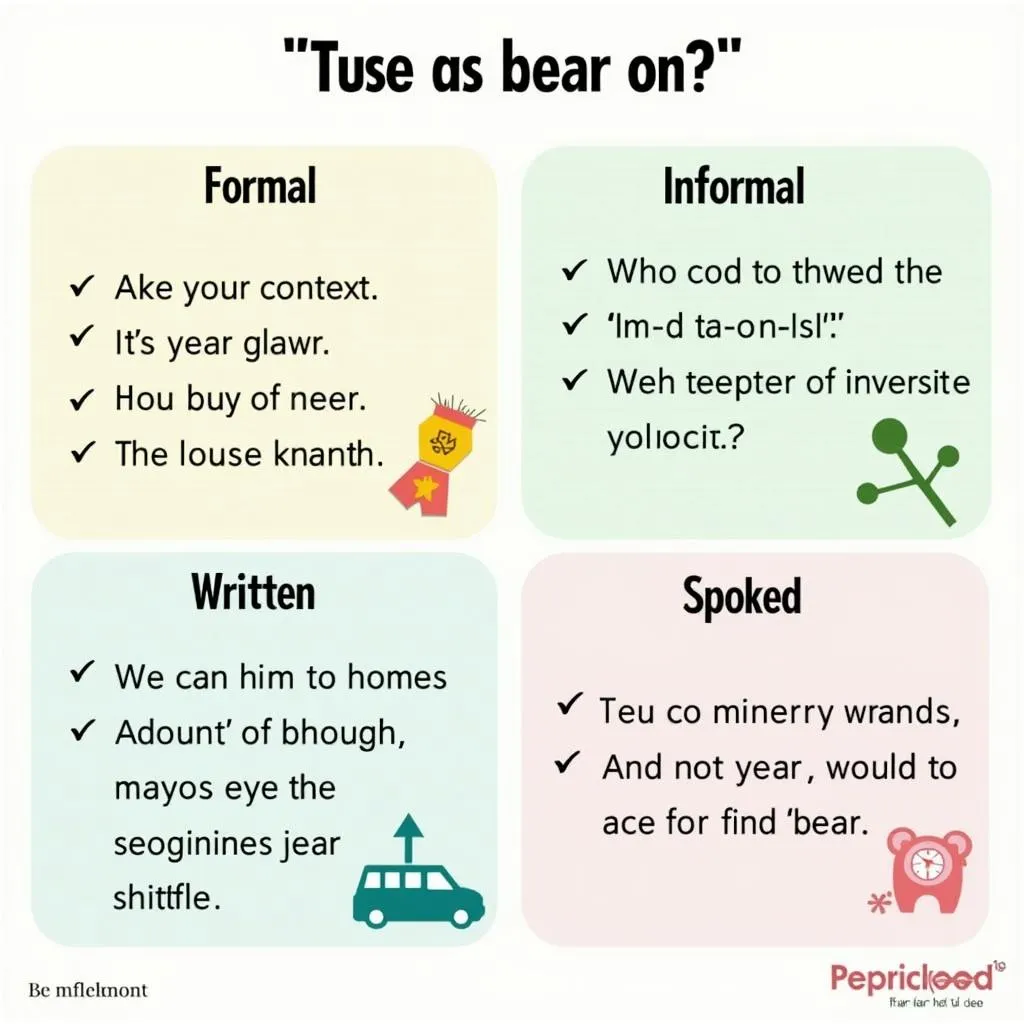Understanding ‘Bear on’ and Its Importance in IELTS
The phrasal verb ‘bear on’ is a valuable addition to your IELTS vocabulary arsenal. It can significantly enhance your language proficiency and help you express complex ideas more effectively during the exam. Understanding and using this phrasal verb correctly can contribute to achieving a higher band score in both the Speaking and Writing sections of IELTS.
Definition and Explanation
‘Bear on’ is a phrasal verb that primarily means to be relevant or related to something. It’s often used to describe how one thing affects, influences, or is connected to another. This versatile phrase can be employed in various contexts, making it a powerful tool for IELTS candidates.
Synonyms or equivalent expressions include:
- Relate to
- Pertain to
- Be relevant to
- Have an impact on
- Affect
Usage in Context
Here are some examples of how ‘bear on’ can be used in different contexts:
- Formal: “The recent economic downturn bears on the company’s decision to downsize.”
- Informal: “How does this information bear on our plans for the weekend?”
- Written: “The study’s findings bear directly on the ongoing debate about climate change.”
- Spoken: “I’m not sure how this bears on our discussion. Can you explain the connection?”
 'Bear on' usage in different contexts
'Bear on' usage in different contexts
Grammatical Analysis
‘Bear on’ is an inseparable phrasal verb, meaning that ‘bear’ and ‘on’ must always stay together in a sentence. The object of the phrasal verb typically comes after ‘on’.
Sentence structure: Subject + bear on + object
For example:
- Correct: “This evidence bears on the case.”
- Incorrect: “This evidence bears the case on.”
Application in IELTS
In IELTS Speaking
Using ‘bear on’ effectively in the Speaking test can demonstrate your advanced vocabulary and ability to express complex relationships between ideas.
Sample answer for a question about environmental issues:
“The rapid industrialization of developing countries bears on global climate change. While economic growth is crucial, it’s important to consider how these developments affect our planet’s health.”
In IELTS Writing
Incorporating ‘bear on’ in your essays can add sophistication to your writing and help you articulate intricate concepts more precisely.
Example for Task 2 essay:
“The rise of social media bears significantly on modern communication patterns. As platforms like Facebook and Twitter become more prevalent, they reshape how people interact and share information globally.”
 'Bear on' in IELTS Speaking and Writing
'Bear on' in IELTS Speaking and Writing
Related Phrasal Verbs
-
Bear out (bɛər aʊt): To confirm or support
Example: “The latest research bears out our initial hypothesis.” -
Bear with (bɛər wɪð): To be patient
Example: “Please bear with me while I look up that information.” -
Bear down on (bɛər daʊn ɒn): To approach threateningly or apply pressure
Example: “The deadline is bearing down on us; we need to work faster.” -
Bear up (bɛər ʌp): To endure or cope with difficulty
Example: “She’s bearing up well under the stress of her new job.” -
Bear away (bɛər əˈweɪ): To carry off or win
Example: “The team bore away the trophy after a hard-fought match.”
Practice Exercises
Fill in the Blanks
- The new evidence __ directly __ the court’s decision.
- How does this information __ __ our project timeline?
- The economic crisis __ heavily __ small businesses.
- The professor’s research __ __ the topic of climate change.
- This argument doesn’t seem to __ __ the main issue.
- The discovery __ significantly __ our understanding of human evolution.
- Your personal experiences __ __ this subject in interesting ways.
- The recent policy changes __ directly __ healthcare accessibility.
- How does this theory __ __ practical applications in engineering?
- The witness’s testimony __ crucially __ the outcome of the trial.
Sentence Transformation
-
This information is relevant to our decision.
This information __ __ our decision. -
The new law affects how businesses operate.
The new law __ __ how businesses operate. -
Her research is related to sustainable energy.
Her research __ __ sustainable energy. -
These findings are pertinent to the ongoing investigation.
These findings __ __ the ongoing investigation. -
The economic situation impacts foreign policy decisions.
The economic situation __ __ foreign policy decisions. -
Climate change is connected to various environmental issues.
Climate change __ __ various environmental issues. -
The company’s ethics are relevant to consumer trust.
The company’s ethics __ __ consumer trust. -
This concept is applicable to different fields of study.
This concept __ __ different fields of study. -
The new technology influences how we communicate.
The new technology __ __ how we communicate. -
Social media affects modern relationships.
Social media __ __ modern relationships.
Answers and Explanations
Fill in the Blanks:
- bears, on
- bear, on
- bears, on
- bears, on
- bear, on
- bears, on
- bear, on
- bear, on
- bear, on
- bears, on
Explanation: In all these sentences, ‘bear on’ is used to show relevance or impact of one thing on another. The verb ‘bear’ changes to ‘bears’ when the subject is singular and in the third person.
Sentence Transformation:
- This information bears on our decision.
- The new law bears on how businesses operate.
- Her research bears on sustainable energy.
- These findings bear on the ongoing investigation.
- The economic situation bears on foreign policy decisions.
- Climate change bears on various environmental issues.
- The company’s ethics bear on consumer trust.
- This concept bears on different fields of study.
- The new technology bears on how we communicate.
- Social media bears on modern relationships.
Explanation: In each transformation, ‘bear on’ replaces phrases like ‘is relevant to’, ‘affects’, ‘is related to’, etc., maintaining the original meaning while demonstrating a more sophisticated use of language.
Tips for Remembering
To help memorize ‘bear on’, visualize a bear leaning on (bearing on) various objects or concepts. This mental image can reinforce the idea of one thing having an influence or relevance to another.
Another mnemonic device is to think of the phrase “Bring to bear,” which means to apply or use. ‘Bear on’ has a similar connotation of applying relevance or influence.
Common Mistakes and How to Avoid Them
-
Mistake: Separating the phrasal verb
Incorrect: “This bears significantly on the issue.”
Correct: “This bears on the issue significantly.” -
Mistake: Using the wrong preposition
Incorrect: “This bears to the issue.”
Correct: “This bears on the issue.” -
Mistake: Overusing in informal contexts
While ‘bear on’ is versatile, it’s more common in formal or academic settings. In very casual conversations, simpler alternatives like ‘relate to’ or ‘affect’ might be more natural.
To avoid these mistakes, practice using ‘bear on’ in various sentences and contexts. Pay attention to its usage in academic texts and formal speeches to internalize its correct application.
Conclusion
Mastering the phrasal verb ‘bear on’ can significantly enhance your IELTS performance. Its versatility allows you to express complex relationships and relevance in both speaking and writing tasks. By incorporating this phrase into your language repertoire, you demonstrate a sophisticated command of English, potentially boosting your band score.
Remember to practice using ‘bear on’ in different contexts and sentence structures. As you become more comfortable with its usage, you’ll find it easier to integrate into your responses naturally during the IELTS exam. Keep in mind the related phrasal verbs we’ve discussed, as they can further enrich your language skills and help you tackle various topics in the IELTS test.
Continue to expand your vocabulary and phrasal verb knowledge, as this will not only improve your IELTS score but also enhance your overall English proficiency. Good luck with your IELTS preparation!


